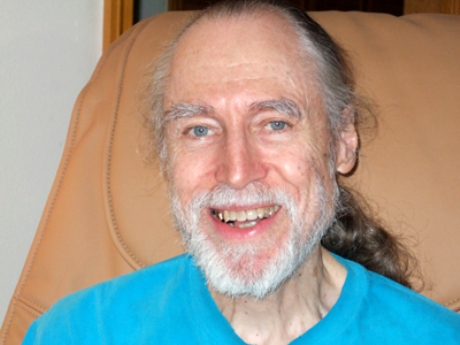

This Month's Special Page:
The Master of Fantasy
Piers Anthony
IN THE "SPECIAL PAGE" ARCHIVES:
Simon Clark
Lisa Morton
John C. Farris
Joe R. Lansdale
Ramsey Campbell
Michaelbrent Collings
Thomas Smith
Bentley Little
Piers Anthony talks to The Horror Zine
JEANI: Over twenty of your books have hit the best seller lists. You have won the August Derleth British Fantasy Award, Golden Pen Award, and have been nominated numerous times for the Locus Poll, Hugo and Nebula Awards. When you first started, did you anticipate such success?
PIERS: No. I just wanted to write, get published, and make a living at it if I could. I had the hodgepodge of employments typical of writers. Of the many types of work I tried (ranging from aide at a mental hospital to technical writer at an electronics company), only one truly appealed: writing, the least successful. But the dream remained.
Finally in 1962 my wife agreed to go to work for a year, so that I could stay home and try to write fiction full time. The agreement was that if I did not manage to sell anything, I would give up the dream and focus on supporting my family. As it happened, I sold two stories, earning $160. But such success seemed inadequate to earn a living.
So I became an English teacher, didn't like that either, and retired again to writing. This time I wrote novels instead of stories, and with them I was able to earn a living. As with the rest of my life, progress was slow, but a decade later I got into light fantasy with the first of my ongoing Xanth series of novels, A Spell for Chameleon, and that proved to be the golden ring.
JEANI: The first book you ever published was Chthon back in 1967. I understand it took you seven years to write. Why did it take that long?
PIERS: I started writing Chthon in 1958 during a two week leave from the US Army, continued it while working at an electronics company in civilian life, and completed it in 1965. So I was distracted from the book because I was trying to earn a living.
JEANI: How long does it take you to write a book today?
PIERS: I can write a Xanth fantasy novel in three months, because fantasy is easy. Historical novels are hard, and take much longer.
JEANI: Your most successful books are your Xanth series, beginning with A Spell for Chameleon in 1977 (which you already mentioned), all the way to your newest book titled Isis Orb (Xanth #40) just released. Why do you think your fans love this series?
PIERS: They tell me that Xanth puts them in the scene, and they love escaping from dreary Mundania for a few hours. I think it gives them a home away from home.
But I also do writing that is not considered fantasy. An example is Firefly, which has direct comment on sexual abuse. I have also written history in novels like Tatham Mound, which relates to the fate of the American Indians, and the Geodyssey series, covering man's past three and a half million years to the present.
JEANI: You are very responsive to your fans, often writing personal letters to them. What do you like and what do you dislike hearing from your fans?
PIERS: I like the usual praise and dislike condemnation which I get mostly from critics, not readers. I dislike requests for collaboration, solicitations for books or money, and demands to visit me personally. Readers would take up all my time if they could, so I couldn’t write. As it is, reader correspondence takes up about one-third of my working time, but I answer them because I like them.
JEANI: You have been quoted as saying that you are “a fan of empathy.” Are you kind to others because you want to give back the kindness that has been shown to you or is it simply part of your overall makeup?
PIERS: It’s part of my makeup. I try to follow the Golden Rule, treating others as I like to be treated myself, and I do care about my readers. I like to think that my fans are a superior breed.
JEANI: You were born in England, yet served in the United States Army. When did you come to America, and why did you choose to settle in Florida?
PIERS: I arrived in America in August 1940 as a child, having my sixth birthday on the boat. My family was Quaker, more properly the Religious Society of Friends, one of whose prime tenets is pacifism. When I turned eighteen, I was eligible for the US draft. So in the end I did not become a Quaker, and when the time came for me to register for the draft, as was required in those days, I did so. The alternative was prison, and I concluded that the Army would do less damage to my person and my philosophy, not to mention my marriage, than prison would. So while my family was shocked by my decision—I saw the jaw of one acquaintance literally drop—I did serve two years in the US Army and I believe today that I made the correct decision.
When I was discharged from the Army in 1959, my wife and I decided to move to Florida. We had family there, and the winters were warm. I had spent several years going to school in the cold winters in Vermont and I do not like the cold weather. I do like the mountainous scenery so we live in north-central Florida where it is hilly, rather than flat.
JEANI: Speaking of Florida, that used to be considered a conservative state, yet your politics are decidedly liberal. How does that work?
PIERS: I am privately sickened by the occasional political foolishness and racism I see. But most folk I meet here are decent. Florida is actually a borderline state, socially and politically.
JEANI: Now the part that my readers really want to know: how do you come up with so many ideas for so many different books?
PIERS: I am the most imaginative person I know. Ideas constantly come to me. So I am simply following my nature.
JEANI: Many writers receive rejection letters before they find success. Did you ever receive rejection letters?
PIERS: Hundreds, and they still occur. Rejections are like stop lights: hard to avoid entirely. So my sympathy remains with rejected writers.
Even you rejected the first story I showed you for The Horror Zine. You rejected "Inversion" because it was erotic, violating your ban on erotica. So I intensified it and put it in my Relationships 5 collection for future publication. I love being able to use you as an example of a rejection I still get.
JEANI: Yes, I think I am getting known as "Jeani the Meani." Do you use a literary agent? Do you have advice for my readers as to how to find one?
PIERS: I do use a literary agent, because what turns me on is writing, not marketing. But my advice for new writers is not to seek agents, but to self publish electronically, such as on Kindle. If you do well, then try for an agent.
JEANI: Do you have advice in general to give to struggling writers who have not yet reached your level of success?
PIERS: Keep writing, keep trying the market, and hope for the best. I wrote and submitted stories for eight years before making my first sale—for $20. Do it for your love of the craft, not for money. It was mostly sheer luck that put me on the bestseller lists, akin to winning a lottery. Remember, Stephen King was going to burn his first novel; his wife stopped him, and later Carrie made it big. He won his lottery, as I won mine. There’s always that hope for any writer.

About Piers Anthony
Piers Anthony was born in Oxford, England, in AwGhost 1934. He spent time with relatives and a nanny while his parents went to do relief work in Spain during the Spanish Civil War of 1936-39. They were helping to feed the children rendered hungry by the devastation of the war. When that ended, Piers and his sister joined them in Spain. He came to America at the age of six.
He received a BA in writing at Goddard College in Vermont, where he met his wife. He has had more than 145 books published, with more in the pipeline, such as the Isis fantasy series.
You can learn more about Piers Anthony HERE


